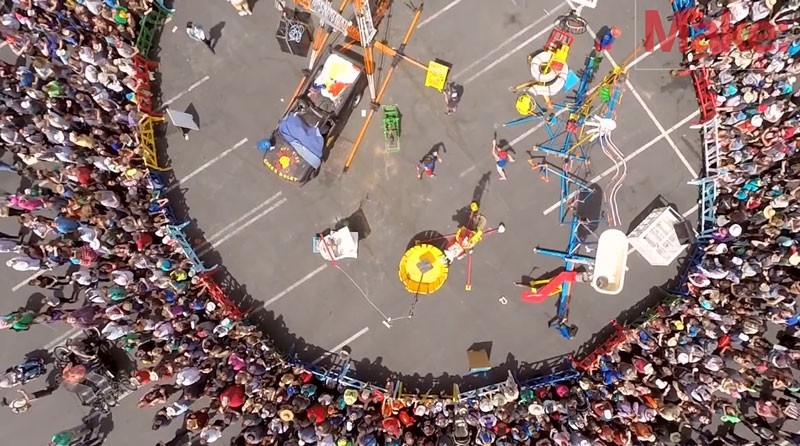Walking the packed grounds of the San Mateo County Fairgrounds this past weekend with my son to attend the 10th anniversary edition of the Bay Area Maker Faire, I couldn't help thinking I was seeing a vision of the future.
Everywhere I turned there were interesting, creative, thoughtful, silly, playful (and every other kind of adjective you can think of) displays of people's creativity. The vast majority had some kind of tech-related angle to them but, in most cases, the technology was subsumed into the overall message of what was being demonstrated. It wasn't tech for tech's sake, but rather, technology used for the purpose of enabling someone's vision of what they wanted to create.
Interestingly, while there were a few booths from big name semiconductor vendors, it wasn't a world dominated by big computers or small-screen computers made by large conglomerates either. Instead, the fairgrounds were filled with home-built inventions, artwork, and ideas driven, for the most part, by very simple technologies: Arduino boards, Raspberry Pis, Beagle Boards, and lots of other microcontrollers.
These circuit boards don't offer anywhere near the processing power of your smartphone---frankly, they aren't much more powerful than a fancy desktop calculator---yet, they drove interactive art installations, toys, craft creation, music production, robots, drones, food monitoring, home control and just about any other kind of application you could possibly think of.
All of which made me start to realize---and appreciate---how much can still be done with even the simplest of computing technologies. All it takes is the interest, drive and creativity of individuals to leverage these boards---and the great ecosystem of software tools, hardware add-ons (often called "shields"), and published how-to materials---to generate a dizzying array of devices and applications.
In many ways, you could argue the Maker Movement---which may not have been started by the Maker Faires, but has certainly grown tremendously because of them---highlight a sort of retro view of the future. (There's a reason why SteamPunk-inspired fashion and creations are so popular at the Maker Faire.) In some instances, there is a kind of odd mix of older technology with newer ideas, as well as the desire to turn even the simplest of items (or even "found" items) into something much more than they were originally intended.
Seeing various types of "vehicles" or art installations around the Faire made with junk metal, yet blended with some kind of technology to give them a new lease on life, for example, is not how many people might initially picture the future (no autonomous driving systems here), yet it seems to be the norm at the Maker Faire.
Projects at the Maker Faire feel like people taking control of the technology, instead of the technology taking control of us, as so often seems to be the case these days.
What's particularly encouraging and enlightening about the Maker movement is it highlights the impact individuals, or small groups of people, can have and what they can achieve with technology. In a sense, it feels like people taking control of the technology, instead of the technology taking control of us, as so often seems to be the case these days.
Even better, the creative work is being done by an enormous range of individuals, all within the confines of a very supportive community. There were numerous booths around this year's Faire sponsored by elementary schools, and even individual children (with their parents, of course), in addition to grizzled, grey-bearded garage hackers, all showing off their creations.
There were all kinds of educational sessions and workshops, as well as lots of questions being answered at individual booths about how things were done, what approaches to take, what types of things were possible, and so on. There was a palpable sense of sharing and the desire to pass on people's skills and expertise to the community at large.
All told, it was an impressive, inspiring event---though a bit of a sensory overload, to be honest---that offers tremendous hope for how technology can be adapted by individuals into their lives, all the while offering a fun, creative outlet. If that's not an inspiring view of the future, I don't know what is.
Bob O'Donnell is the founder and chief analyst of TECHnalysis Research, LLC a technology consulting and market research firm that provides strategic consulting and market research services to the technology industry and professional financial community. You can follow him on Twitter @bobodtech. This article was originally published on Tech.pinions.
